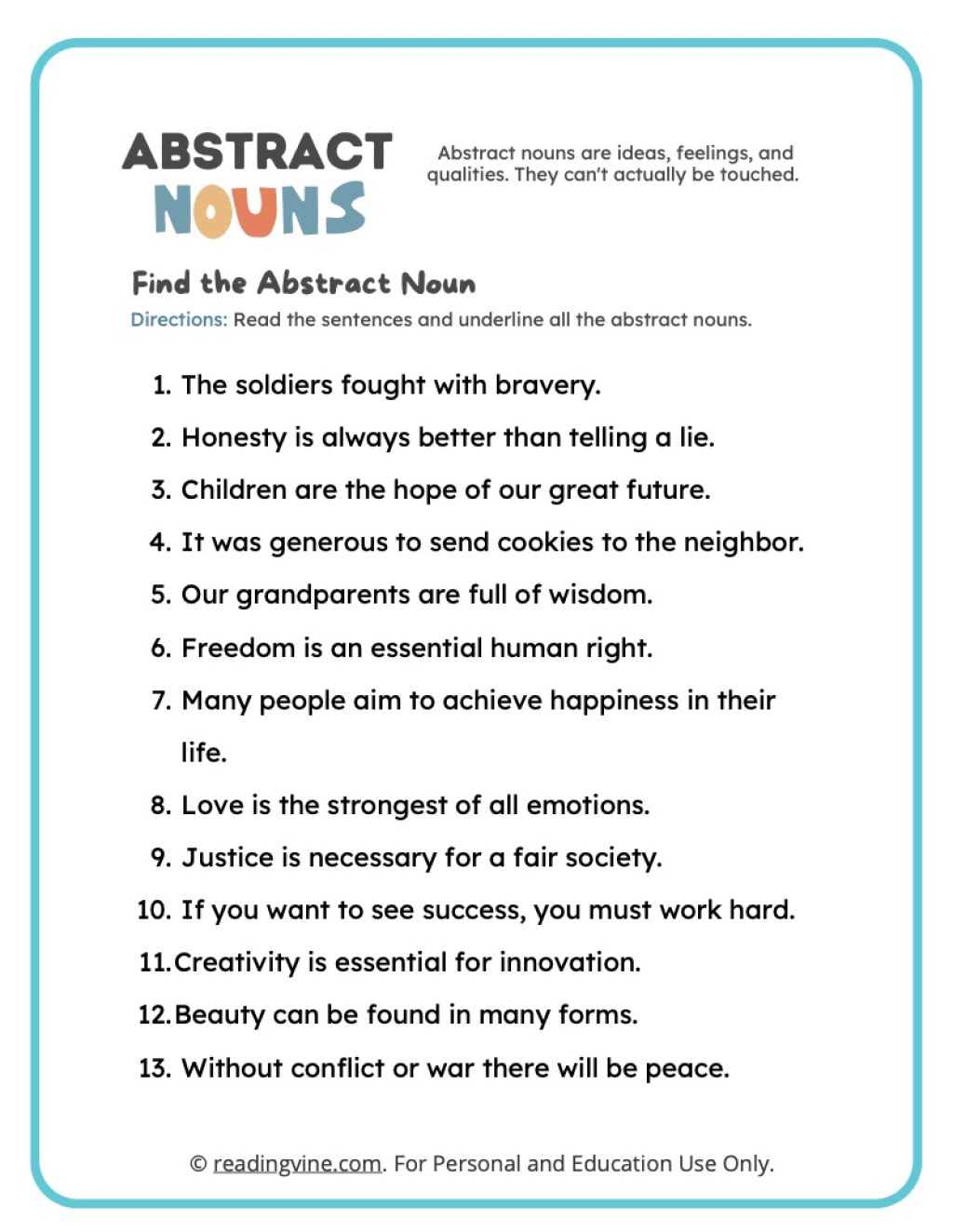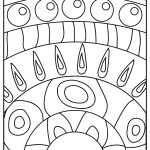Mastering Abstract Nouns: Empower Your Learning With Our Engaging Worksheet
Mastering Abstract Nouns with Engaging Worksheets
Introduction
Welcome, Smart Readers! Are you ready to delve into the world of abstract nouns? Abstract nouns are powerful tools in the English language that allow us to express intangible qualities, emotions, and concepts. To help you grasp the essence of abstract nouns, we have prepared an extensive collection of worksheets that will make your learning journey both enjoyable and effective. In this article, we will explore the importance of abstract nouns, their usage, and how our worksheets can enhance your understanding.
2 Picture Gallery: Mastering Abstract Nouns: Empower Your Learning With Our Engaging Worksheet


The Significance of Abstract Nouns
Abstract nouns play a vital role in communication, as they enable us to express emotions, ideas, and qualities that cannot be seen or touched. By using abstract nouns, we can convey complex feelings such as love, happiness, or sorrow, as well as concepts like freedom, justice, and success. Understanding abstract nouns is essential for effective writing and speaking, as they add depth and richness to our language.
Types of Abstract Nouns

Image Source: liveworksheets.com
Abstract nouns can be classified into various categories, including emotions, states, qualities, ideas, and phenomena. Emotions encompass feelings such as joy, anger, and fear, while states refer to conditions like happiness, peace, and confusion. Qualities describe attributes such as honesty, bravery, and intelligence, while ideas encompass concepts like love, democracy, and friendship. Lastly, phenomena include words like time, space, and nature.
Exploring Abstract Nouns through Worksheets
Our abstract nouns worksheet collection comprises a wide range of exercises designed to enhance your understanding and usage of these linguistic gems. Each worksheet is meticulously crafted to engage learners, featuring thought-provoking questions and activities that encourage critical thinking. By completing these worksheets, you will sharpen your skills in identifying and using abstract nouns in context.
What are Abstract Nouns?

Image Source: readingvine.com
Abstract nouns are words that represent intangible concepts or ideas. They cannot be perceived through the five senses and are often derived from adjectives, verbs, or other nouns. For example, the word happiness is an abstract noun derived from the adjective happy. Abstract nouns are crucial for expressing emotions, qualities, and ideas that enrich our language.
Who Uses Abstract Nouns?
Abstract nouns are used by individuals from all walks of life. Writers employ abstract nouns to evoke emotions and create vivid imagery in their works. Poets use these nouns to convey deep and profound experiences to their readers. Speakers incorporate abstract nouns in speeches to inspire and motivate their audience. Regardless of your profession or interests, abstract nouns are an integral part of effective communication.
When to Use Abstract Nouns?
Abstract nouns are used whenever we want to express feelings, concepts, or qualities that are intangible. They are particularly valuable when writing poetry, expressing personal beliefs, or discussing philosophical ideas. Abstract nouns add depth and complexity to our language, allowing us to communicate on a deeper level and paint a more vibrant picture with our words.
Where Can Abstract Nouns Be Found?
Abstract nouns can be found in a plethora of contexts, including literature, speeches, songs, and everyday conversations. They are prevalent in works of fiction and poetry, where authors use them to create imagery and evoke emotions. Additionally, abstract nouns are frequently used in academic writing, as they allow scholars to articulate complex ideas and theories.
Why Are Abstract Nouns Important?
Abstract nouns are important because they enable us to communicate intangible qualities and ideas. They add depth and emotion to our language, allowing us to express ourselves in a more nuanced manner. By mastering abstract nouns, you will enhance your writing, speaking, and overall communication skills, enabling you to connect with others on a deeper level.
How to Use Abstract Nouns?
Using abstract nouns effectively requires an understanding of their usage in context. When incorporating abstract nouns into your writing or speech, it is crucial to ensure they are clear and specific. Providing examples, using metaphors or similes, and appealing to the senses can help make abstract nouns more tangible and relatable to your audience.
Pros and Cons of Using Abstract Nouns
Like any linguistic device, abstract nouns have their advantages and disadvantages. On the positive side, abstract nouns allow us to express complex emotions, qualities, and ideas that cannot be described using concrete nouns. They add depth and richness to our language, facilitating more profound connections. However, abstract nouns can be challenging to grasp for beginners and may require additional practice and guidance to master.
Advantages of Utilizing Abstract Nouns
1. Enhanced Emotional Expression: Abstract nouns enable us to articulate our emotions in a more nuanced and precise manner. They allow us to convey complex feelings with depth and intensity.
2. Improved Communication: Mastering abstract nouns enriches our vocabulary and enhances our communication skills, enabling us to express our thoughts and ideas more effectively.
3. Deeper Writing: Abstract nouns add depth and complexity to our written works, making them more engaging and thought-provoking. They enable us to create vivid imagery and evoke emotions in our readers.
4. Philosophical Exploration: Abstract nouns are essential for discussing philosophical ideas and concepts. They facilitate contemplation and encourage critical thinking.
5. Expanded Creative Expression: Abstract nouns are a powerful tool for artists, writers, and poets, as they allow for the exploration of intangible concepts and emotions, resulting in more captivating creations.
Disadvantages of Utilizing Abstract Nouns
1. Ambiguity: Abstract nouns can sometimes be ambiguous, leading to confusion or misinterpretation. It is crucial to provide clarity and context when using abstract nouns in communication.
2. Complexity: Understanding and correctly using abstract nouns may be challenging for language learners or individuals who are not familiar with their usage. Practice and guidance are necessary to fully grasp their meaning and function.
3. Overuse: Excessive use of abstract nouns can make writing or speech overly complex or vague. It is essential to strike a balance and ensure that abstract nouns are used purposefully and effectively.
4. Subjectivity: Abstract nouns often express subjective experiences or qualities, which can differ from person to person. It is important to consider the audience’s perspective and maintain clarity in the intended meaning.
5. Lack of Tangibility: As abstract nouns represent intangible concepts, they may lack the concrete imagery that some readers or listeners prefer. Providing relatable examples or metaphors can help bridge this gap.
Frequently Asked Questions
1. What is the difference between abstract nouns and concrete nouns?
Abstract nouns represent intangible concepts or ideas, while concrete nouns refer to tangible objects or things. For example, love is an abstract noun, while book is a concrete noun.
2. Can abstract nouns be plural?
Abstract nouns are typically not pluralized, as they represent concepts or qualities that are not counted or quantified. However, some abstract nouns can be modified to indicate a specific instance or type.
3. Are all emotions considered abstract nouns?
No, not all emotions are considered abstract nouns. While emotions like anger, happiness, and sadness are abstract nouns, words like smile and tear can be both abstract and concrete nouns, depending on the context.
4. Can abstract nouns be used as verbs?
Most abstract nouns cannot be used as verbs, as their primary function is to represent concepts or qualities. However, some abstract nouns can be converted into verbs by adding suffixes or modifying them.
5. How can I improve my understanding and usage of abstract nouns?
To improve your understanding and usage of abstract nouns, practice is key. Engaging with worksheets, reading literature, and actively incorporating abstract nouns into your writing and speech can help you master this linguistic device.
Conclusion
Now that you have embarked on this journey of exploring abstract nouns through our comprehensive worksheets, it is time to put your newfound knowledge into action. As you continue your learning, remember to embrace the power of abstract nouns in expressing intangible qualities and ideas. Whether you are a student, a writer, or simply an individual seeking to improve your communication skills, understanding and utilizing abstract nouns will undoubtedly elevate your language proficiency. Dive into the world of abstract nouns and unlock a world of creativity and expression!
Final Remarks
This article aims to provide an in-depth understanding of abstract nouns and their significance in the English language. It is essential to remember that abstract nouns are subjective and open to interpretation. As you explore the vast realm of abstract nouns, embrace your creativity and find unique ways to express your thoughts and emotions. We hope that our engaging worksheets and comprehensive information have empowered you to master abstract nouns and enhance your linguistic abilities. Happy learning!
This post topic: Abstract



